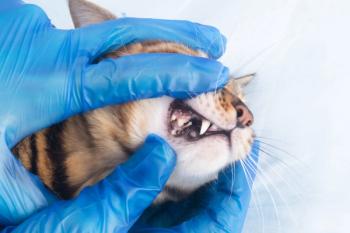
Presentation Recap: Will allergen-specific immunotherapy cure feline asthma someday?
This form of therapeutic intervention may be just the answer for this disease that affects up to 5% of the pet cat population.
In a series of Morris Animal Foundation-funded studies, researchers at the University of Missouri’s College of Veterinary Medicine are evaluating whether allergen-specific immunotherapy (ASIT) will ultimately provide a cure for feline asthma, a disease estimated to affect up to 5% of the pet cat population.
Dr. Carol Norris Reinero summarized recent and ongoing feline asthma studies as part of the Morris Animal Foundation’s first research symposium at the NAVC in Orlando, Fla., on Jan. 15.
Because ASIT can take several months to work, the researchers first evaluated a shortened treatment protocol-called rush immunotherapy (RIT)-in order to evaluate response to treatment within a shorter time. The RIT protocol is often used in dogs and people with asthma, and in this study it involved rapidly loading increasing doses of a common allergen in cats-Bermuda grass-in cats with experimentally induced asthma. The results revealed significant reductions in airway inflammation.1
A subsequent study evaluated subcutaneous vs. intranasal RIT in cats with experimentally induced asthma. Six months after allergen challenge, both groups had significantly lower clinical respiratory scores compared with baseline and significantly decreased bronchoalveolar lavage fluid (BALF) % eosinophils. In fact, 10 of 12 cats had normal BALF % eosinophils, which suggested a cure.2 In addition, the group that received subcutaneous RIT subjectively showed better clinical response after allergen challenge and the subcutaneous route was the preferred administration method.
In another study, the researchers evaluated whether intradermal skin testing (IDST) or a serum allergen-specific IgE ELISA would better identify aeroallergen sensitization in experimentally induced asthma in cats sensitized with either house dust mite allergen, another common allergen in cats, or Bermuda grass allergen. Results showed that IDST had higher sensitivity than serum allergen-specific IgE measurement, but both tests had good specificity. These results mean that the IDST may be a better screening test, but that either test could be used to help select allergens used in ASIT.
A second part of this study evaluated two commercial laboratories that perform allergen-specific IgE measurement in cats using ELISA or enzymoimmunometric assay. The results demonstrated that the enzymoimmunometric assay did not detect Bermuda grass allergen-specific IgE and inappropriately identified allergens that the cats had not been sensitized to.3 The researchers concluded that IDST and allergen-specific IgE measurement using ELISA could be used to guide allergen selection for immunotherapy, and that more rigorous studies need to be done to evaluate the accuracy of laboratories that measure feline allergen-specific IgE if ASIT is to become a useful treatment for asthma in cats.
In a different study, cats with experimentally induced asthma were sensitized with one allergen but given a different allergen in their RIT protocol in order to identify whether incorrect selection of allergens-which could likely occur when trying to identify the allergens pet cats react to-would provide cross-protection against the causative allergen. The results showed that giving the incorrect allergen in RIT does decrease eosinophilic airway inflammation (unpublished data), but that the immunologic mechanisms differed from that in cats sensitized to and treated with the same allergen.4
In ongoing studies, the researchers are evaluating whether corticosteroids may affect serum or intradermal allergen-specific IgE test results or RIT efficacy, because it is likely that pet cats will need inhaled or oral corticosteroid treatment to alleviate clinical signs during the period when their allergens are being identified and during initial immunotherapy.
The results of these studies are promising and support that ASIT reduces airway inflammation in cats with experimentally induced asthma and may one day cure this disease. However, before routinely recommending this treatment in pet cats with asthma, much consideration must given to correctly identify the causative allergens before initiating immunotherapy, and questions must be answered regarding the potential impact of concurrent or recent corticosteroid therapy.
REFERENCES
1. Reinero CR, Byerly JR, Berghaus RD, et al. Rush immunotherapy in an experimental model of feline allergic asthma. Vet Immunol Immunopathol 2006;110(1-2):141-153.
2. Lee-Fowler TM, Cohn LA, DeClue AE, et al. Evaluation of subcutaneous versus mucosal (intranasal) allergen-specific rush immunotherapy in experimental feline asthma. Vet Immunol Immunopathol 2009;129(1-2):49-56.
3. Lee-Fowler TM, Cohn LA, DeClue AE, et al. Comparison of intradermal skin testing (IDST) and serum allergen-specific IgE determination in an experimental model of feline asthma. Vet Immunol Immunopathol 2009;132(1):46-52.
4. Reinero CR, et al. Immunomodulation with allergen-specific immunotherapy in feline asthma. Invited expanded research abstract, Veterinary Comparative Respiratory Society, ACVIM Forum, 2009.
Newsletter
From exam room tips to practice management insights, get trusted veterinary news delivered straight to your inbox—subscribe to dvm360.





